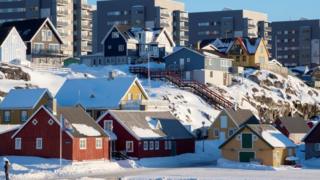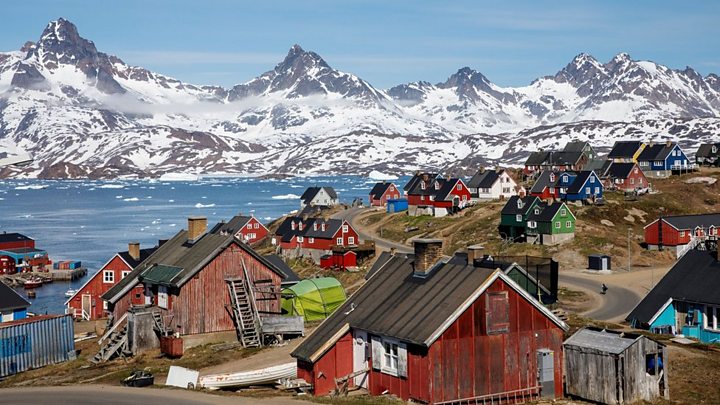Greenlanders on Trump wanting to buy their island
This week has seen one of the most bizarre diplomatic rows of Donald Trump’s presidency.
Insults have been exchanged, tweets have been sent, major visits have been cancelled – and this all happened because the US president said he wanted to buy Greenland.
It started with an article in the Wall Street Journal which, quoting sources, claimed the US president had “with varying degrees of seriousness, repeatedly expressed interest in buying the ice-covered autonomous Danish territory”. Initially dismissed by many as rumour, the claims were later confirmed by Mr Trump himself.
Denmark’s prime minister Mette Frederiksen was swift and unambiguous in her response, calling his idea of buying the island “absurd”. Shortly afterwards, Mr Trump cancelled a state visit to Denmark that had been planned for 2 September, accusing Ms Frederiksen of being “nasty”.
So, what do Greenlanders make of all of this?
‘For me, this is very scary’
“This is a very dangerous idea,” Dines Mikaelsen, a tour operator who was born and raised in Tasiilaq, East Greenland, told the BBC.
The US has had a military presence in Greenland since World War Two, with numerous military bases across the island, including a secret Cold War-era nuclear base called Camp Century.
This presence has been extremely controversial. Almost all of these bases lie abandoned in remote Greenland locations. In the case of Camp Century, there are fears that the rapidly melting ice on which it was built will expose the environment to nuclear waste within decades.
Only Thule Air Base remains – and while Thule is best known in the US for being placed in a strategically important location, in Greenland, it is associated with the displacement of the indigenous Inughuit community, who in 1953 were given four days to leave their homes to make way for the base’s expansion.
For Mr Mikaelsen, this was all at the front of his mind when he heard of President Trump’s ambitions.
“We have so many [US] military bases that have been left for many many years, and you can see the rust everywhere… they have left so much trash in Greenland,” he said.
The remains of one decaying World War Two base, Bluie East Two, is about 59km (37 miles) from his hometown Tasiilaq.
“They also move people without asking them,” he added, describing the expropriation of the Inughuits. “If they [the US] buy Greenland, they would just move people around and build it up with military bases… our population is only 56,000, and for me, this is very scary.”
‘He’s treating us like a good he can purchase’
Aleqa Hammond, who was Greenland’s first female prime minister and later chair of the Greenland Committee in the Danish Parliament, tells the BBC that this is a common feeling among the island’s residents.
“The American presence in Greenland is not to the benefit of Greenlanders,” she said. “Even though America said, and Denmark said, that the expansion [of the Thule Air Base in 1953] was just in case there was an attack from Russia… we see it differently. We never asked Americans to come. Denmark allowed them to come and build an air base.
“Then, the Americans and Denmark together only gave the Inughuit people four days to move out of their homes, and told them that if they didn’t move out they would demolish their houses – because [they said] it was important that they built the air strip right then, because the Cold War was going on.
“This is the way Americans have been treating the Greenlanders, and of course, even though it was many years ago, it’s still part of our history with America.”
Then there’s the issue of President Trump himself.
Ms Hammond said Mr Trump’s blunt proposal showed a lack of sensitivity to this history, and that his attitude to Greenland was “very arrogant”.
“He’s treating us like a good he can purchase,” she said. “He’s not even talking to Greenland – he’s talking to Denmark about buying Greenland.”
Ebbe Volquardsen, a professor of culture and social history at the University of Greenland, raises the same question: “Trump is talking about buying Greenland, but the first question is, who is he buying it from?
“Then it turned out that he wanted to buy it from Denmark, as if Greenland is the property of Denmark,” he told the BBC. “Which of course is not the case.”
‘Very disrespectful’
When Prof Volquardsen, along with the rest of the world, realised that President Trump was not joking about buying Greenland, it dawned on him that it was “a very serious matter”.
“The President of the United States is not recognising a people’s right to self-determination,” he says, adding that this ironically comes just after the 10th anniversary of the 2009 Self-Government Act in Denmark, which legally recognised Greenlanders’ right to self-determination. “It’s very disrespectful to many people here in Greenland.”
He feels the Danish prime minister, however, was “very professional” in the way she dealt with the request: “[Ms Frederiksen] made clear from the beginning that Greenland is not for sale, and she also made clear that it is not for Denmark to decide.”
And if the US were to take control of Greenland, it would be “devastating” for the island’s welfare system, Greenlandic politician Aaja Chemnitz Larsen told the BBC.
Ms Larsen, who represents one of two seats for Greenland in the Danish parliament, said it would be “really difficult to see how an American system would ensure the inequality in Greenland would be lower in the future”, compared to the island’s current Nordic model for welfare.
But she believes that, despite the odd way this story has unfolded, this opportunity could be turned into a positive.
“I think it’s important to be constructive and to look forward, and to look at the clear interest there is from the US in Greenland,” she said.
“Could it be something that we could [use to] focus much more on collaboration on other issues instead? For example when it comes to business development in Greenland, investment in our industries, or exchange programmes for students in Greenland and the US.
“I think it’s important to look beyond the fact that it’s Trump who’s the president of the United States right now, and to look ahead and be constructive instead. That’s at least how I see it.”
Source: Read Full Article




